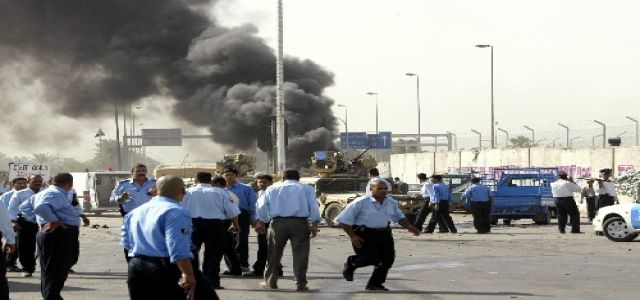|
|||||||||
| :: Issues > Iraq | |||||||||

How US-resistance talks are seen in the Green Zone
There is understandably a lot of attention being devoted to talks and/or cooperation in Iraq between the US and local armed groups associated with tribes and/or resistance groups. In the West this is uniformly taken up as a feature of the fight against AlQaeda, and in a more remote way as possibly having relevance to the question of US "withdrawal", real or apparent.
|
|||||||||
| Sunday, July 22,2007 11:55 | |||||||||
|
|||||||||
|
There is understandably a lot of attention being devoted to talks and/or cooperation in Iraq between the US and local armed groups associated with tribes and/or resistance groups. In the West this is uniformly taken up as a feature of the fight against AlQaeda, and in a more remote way as possibly having relevance to the question of US "withdrawal", real or apparent. An American diplomat denied there is any substitute Plan B in the strategy of the United States in Iraq against the Maliki government, and he insisted that communications with armed groups have been carried out with the knowledge of the Iraqi government, and [he said] Washington is currently focused on supporting and strengthening the political process, for the realization of the desired aims. The diplomat in question is political attache at the American embassy, David Galbraith, and in the course of this interview-summary the denial of any American scheme or conspiracy against the Maliki government, is repeated over and over, and always in connection with the "talks with the resistance" point. For instance later on the journalist quotes Galbraith denying any discussion of an American role in any "conspiracy" against the Iraqi government. And as far as the communications with armed groups in Iraq are concerned, Galbraith said these communications were carried out with the knowledge of the Iraqi government, and with its support. However he added: "Some of our positive talks in Anbar and Diyala led to further discussions with groups that are called "resistance" or "rebel", which began to cooperate with the Iraqi and American forces in fighting AlQaeda, and this is an example of talks between us and armed persons who work with the resistance". Galbraith pointed to the difference between AlQaeda which is a world-wide terror movement on the one hand, and certain groups that take up arms against us and against the Iraqi forces, and we will fight them too if they continue, and he conditioned the continuation of these talks on these groups" keeping up their commitment to fighting AlQaeda. If the point about "no plan B" seems somewhat remote, please recall the frightening CBS report of July 7 that said the Maliki government was in dire straits on account of a plan by something called the "Iraq Project" to topple him. What happened after that is that the Great Eraser of Media Talking Points wiped that issue completely off the blackboard for Western readers, turning our attention instead to this theme of US v AlQaeda. What is important to remember is that US support for Sunni armed groups is going to be seen in Iraq, and rightly so, in the Sunni-Shia context. And it is important to notice the degree to which anglosphere commentary aggressively eliminates that context from the discussion. Partly, no doubt, because it recalls in the broad sweep of things the American penchant for playing one sect off against the other. |
|||||||||
|
Posted in Iraq |
|||||||||
|
|||||||||
|
|
|||||||||
| Related Articles | |||||||||
|
|






